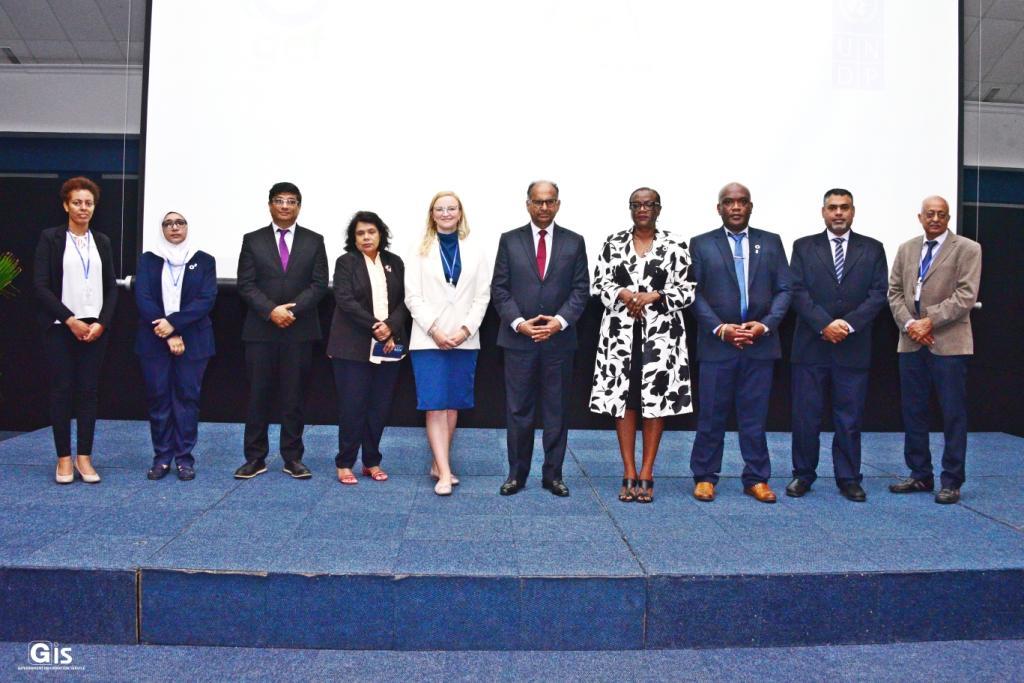Africa-Press – Mauritius. In the context of the GEF-7, an inception workshop on the Project “Promoting Low-Carbon electric public bus transport in Mauritius” opened, this morning at the Ravenala Attitude Hotel in Balaclava.
The Minister of Land Transport and Light Rail, Mr Alan Ganoo, the United Nations Development Programme (UNDP), Ms Amanda Serumaga and other stakeholders were present. The project is a collaboration of the Ministry of Land Transport and Light Rail, the UNDP and the Global Environment Facility (GEF).
The objective is to promote capital investments into developing sustainable transport infrastructure to reduce transport-related GHG emissions in Mauritius to mitigate climate change; and engage and build technical capacity of transport-related policymakers, Government agencies, financial institutions and the private sector.
In his address, Minister Ganoo stated that Mauritius pledged to fulfill the objectives of the Paris Agreement, which is a legally binding international treaty on climate change, at the 26th session of the COP26 Summit in 2021 in Glasgow.
In a bid to meet the objectives of the treaty, Government, he highlighted, announced a public transport decarbonisation programme in Budget 2023-2024 to support the country in transitioning towards a modern, low-carbon, inclusive and sustainable public bus transport sector.
The aim is to increase the share of renewable energy to 35 % of the energy mix by 2025 and maintaining it at this target by 2030, he said. The Minister pointed out that the public transport system is the backbone of the economic growth and social life in the country indicating that the Mauritius counts some 654 531 vehicles, out of which 2038 represent public buses.
Some 500 000 passengers commute by the public transport daily, including some 40 000 through the Metro Express, he added. Nevertheless, he remarked that the transport sector is the second largest emitter of greenhouse gases in Mauritius with a total Greenhouse Gas emission to around 1350 metric tons of carbon dioxide representing approximately 28% of total emissions.
As for the environmental costs of buses, he said that they amount to Rs 327 million per year. Government envisions to provide a clean, green, inclusive, resilient, affordable, equitable and safe public transport system through the provision of decarbonised transportation options which will also help to rehabilitate the ecological infrastructure, he underpinned.
One of the laudable initiatives of Government is the introduction of the light rail system, he emphasised. Other measures include new roads with dedicated bicycle lanes; and incentives to bus operators to encourage them to adopt electrification of their fleet.
Similarly, electric buses, he stressed, have been introduced in Mauritius, on a pilot basis since 2019 and the running cost of an electric bus is only 25% as compared to a diesel bus.
The Minister, likewise, dwelt on the benefits of electric buses including better comfort for passengers, creation of jobs; women empowerment The Transport Minister further mentioned that Mauritius is well set on its journey to a greener transport system.
“The project will facilitate the introduction of 60 electric buses and 15 charging stations for public bus transport supporting Government’s transport energy strategic goal of having more electric buses on our roads by 2025, thereby reducing fossil fuel consumption, greenhouse gas emissions and pollution from the transport sector”, he stated.
For her part, Ms Serugama stated that emissions from the transport sector are a major contributor to climate change with nearly one quarter of carbon dioxide.
The UNDP, she said, is of the hope that the project will be instrumental in transforming the transport sector of Mauritius by promoting low carbon public bus transport system.
Underlying the increasing number of vehicles to the world’s existing fleet, she pointed out that Africa’s urban transportation contributes to around 25% emissions in the transport sector which is expected to increase by 2030. She, therefore, lauded Mauritius for embarking on the project, and reiterated the support of the UNDP for the its successful implementation.
For More News And Analysis About Mauritius Follow Africa-Press







